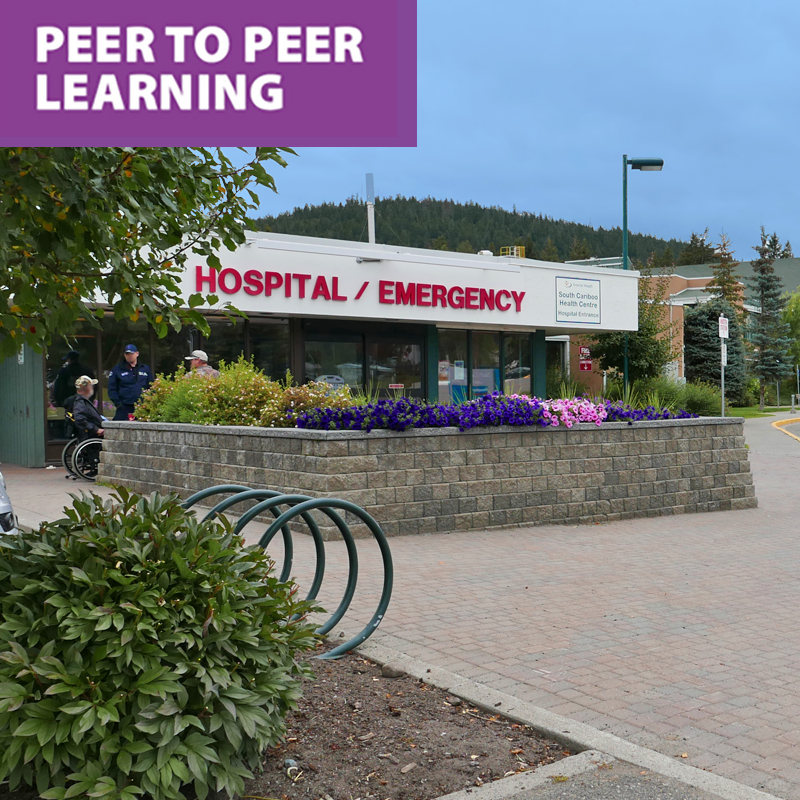
On January 9th, 2025, rural MSAs from across the province came together to attend a “Quick-Wins Workshop” that focused on strengthening strategic partnerships, optimizing funding sources, and enhancing leadership and project management skills for Facility Engagement (FE) participants.
There was representation from 18 rural MSAs, including 22 MSA executives and 14 MSA administrators.
Presentations and Takeaways
Physicians participating in FE presented projects that were “quick wins” in their respective communities, including:
- reviving the visiting specialist program,
- implementing a cultural safety and humility experiential learning initiative,
- organizing multidisciplinary learning and engagement events, and
- creating an onboarding manual for locums and new medical staff.
See the video presentations and takeaways below.
Takeaways
Dr Chelsea Anchikoski presented a project on reviving the visiting specialist program at Arrow Lakes Hospital in Nakusp, which had failed due to various reasons such specialist retirement, prolonged facility renovations, and COVID.
Dr Anchikoski discussed the challenges faced by patients in the community, including low high school graduation rates, low average household income, and high rates of smoking, alcohol consumption, and drug use, which contribute to patients missing their specialist appointments at facilities 2-3 hours away.
She shared how the Medical Staff Association (MSA) transformed the clinical space and is attracting visiting specialists to the facility by partnering with local family physicians, specialists, hospital administrators, and the hospital foundation to remove barriers to practicing at the hospital.
This work has included meeting with the visiting specialists prior to their visit to ensure they had the appropriate supports to practice there – such as a computer with programs such as fluency, setting up an office space, ensuring administrative support, and more.
Dr Bruce Nicolson presented on the cultural safety and humility program at 100 Mile District General Hospital.
He shared how they partnered with the local First Nations community to provide a half-day cultural immersion program for their physicians.
The program included a smudging ceremony, a tutorial on natural remedies, storytelling, and a traditional meal.
Dr Nicolson reported that the engagement activity was successful in making the physicians feel more comfortable working with First Nations patients and that it was an enjoyable experience for everyone involved.
He concluded by stating that they plan to continue the program on a yearly basis and that the project is well suited to be adapted for other communities.
Click here to learn more.
Patti King, Interior Engagement Manager, presented on behalf of the Golden and District Hospital MSA about their multi-disciplinary Dine and Learn events, which aimed to bring people together for learning and relationship-building in a casual and social setting.
The specific event highlighted was 'followership in trauma', which was held at a local restaurant and included physicians, nurses, health authority administrators, and paramedics.
Facility Engagement funding covered the speaker fees and catering for the event, and attendees emphasized the value of these sessions in fostering connections and learning beyond the event.
Dr Peter Verheul discussed how their site developed and has maintained an onboarding manual for locums and new medical staff at Salt Spring Island, which was developed to address the challenges with emergency room coverage and the need for improved staff onboarding.
Dr Verheul noted how this project proved to be high impact with positive feedback from locums and new medical staff while requiring minimal amounts of physician time.
He also highlighted a key success factor was the support of their MSA administrator who helped in developing the manual and ensuring it stays up to date.
The workshop included an improv exercise called “yes, and…” to encourage creative thinking, which focused on brainstorming ideas without constraints.
The exercise involved building on each other's ideas in a positive way to set the tone for moving into break-out rooms to workshop making these ideas into actionable project plans.
Engagement Partners can help connect MSAs with resources, funding opportunities, and other sites for collaboration and knowledge-sharing.
The Facility Engagement Knowledge Sharing Portal is a helpful resource for project examples and resources and see here for a list of engagement activities curated specifically for Tier 1 MSAs.
MSA administrators are encouraged to utilize the Project Manager (PM) Help Desk and monthly PM Lunch and Learns for support.
There are other SSC initiatives and RCCbc programs that can be used alongside Facility Engagement to support rural MSA engagement work.
Quick-Wins Engagement Activity Guide – including step-by-step project templates for numerous projects from around the province, including those presented on at the workshop.
36.4% of respondents strongly agreed and 50% agreed that attending the session increased their knowledge of physician-led projects and activities funded through Facility Engagement.
22.7% of respondents strongly agreed and 54.5% agreed that after participating in this session, they feel confident applying at least one key tactic and/or process learned from other sites' successes at their own site.
18.2% of respondents strongly agreed and 59.1% agreed that attending the session enabled them to consider new approaches to tackling complex challenges.
Video quick links
Reviving Visiting Specialist Program – Nakusp | 1:34
Cultural Safety & Humility Program – 100 Mile House | 8:01
Multidisciplinary Dine & Learn Events – Golden | 13:48
Locum and New Medical Staff Manual – Salt Spring Island | 19:16
Download
Quick-Wins Engagement Activity Guide
![]()
Connect with the project for more information>
Share strategies that are working for you>


